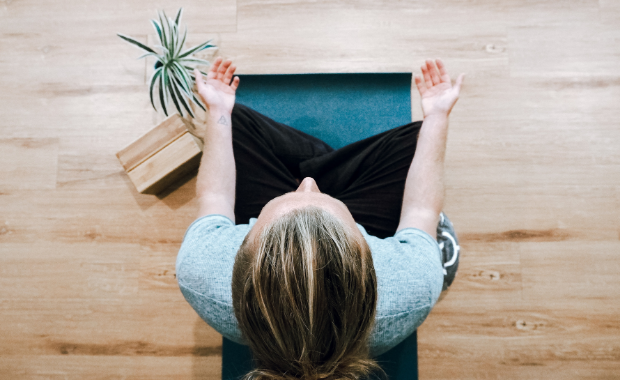Life
How to Make Mindfulness a Practical Skill

My journey from glossing-over life to immersing myself in life has been far from glamorous but one dripping with satisfaction that comes from self-growth. From only being able to academically spell m*i*n*d*f*u*l*n*e*s*s to making it a practical way of life is now my personal mission.
I have approached mindfulness like a curious child to understand how I can make it work for me. Some of the questions I asked were, what will it do for me? The answer to that was – there is only one way to find out, and that is by immersing myself.
I am sharing 5 nuances of Mindfulness that are now entwined in my life. It took many years of understanding and then implementing before I could find the right language to express them and make them into bite-sized workable thoughts.
Here are 5 ways to make mindfulness practical:
1. Being mindful
Being mindful is being attentive, alert, and present to a situation. Come to think of it, mindfulness has been an expectation from us throughout our lives.
Long before mindfulness became popular in the spiritual sense, the corporate world used the term extensively. ‘Be mindful that whilst you make this change, it will impact the bottom-line,’ or the board rooms usually echoed with ‘bear in mind that we don’t have a big budget.’ Mostly it was someone a level higher with broader responsibilities reminding us that there were more factors to consider when making a decision, ‘so, don’t overlook them.’
This is quite aligned to life. Mindfulness means we are alert and present and consider all possibilities. ‘Being present’ is also no different from how our schools made us respond to the daily attendance roll call.
So, check-in with yourself as often as you can – am I present when drinking this coffee or when talking on the phone? The more frequently I asked myself this question, the more alert I became to the situation at hand and that was the first step towards mindfulness. It expands your range of thinking like nothing else can do. And that opens doors of possibility.
“Do not dwell in the past, do not dream of the future, concentrate the mind on the present moment.”- Buddha
2. Work hard, party hard and in between the two, sleep enough
Working on a few hours of sleep was a badge of pride I wore just like a lot of my colleagues during my prolific corporate career. The coffee machine was the holy ground for discussing the hours of sleep we all had the previous night. The more senior the person and the fewer his hours they slept made them a bigger hero in everyone’ eyes. We thought that’s what we all needed to do to grow. So, we continued to campaign – work hard, karaoke hard, and party hard.
It took me many years to realize how lack of sleep was hollowing out my productivity, my alertness, and my mood. Very casually, I started listening to the timeless rules of sleeping for a productive day. I cannot even begin to tell how it has transformed my life.
You will usually find me in an upbeat mood and generally energized and enthused in life. I hear myself even laughing a lot more. Why had I not done it all these years? Oh well, there is never a good answer to that. But we can start now. Sleep is a gift we can give ourselves every single day. So, let’s do it.
3. Self-Love
Over the years, I have been working on making self-love practical. It is a big subset of mindfulness because it means we listen more to ourselves. So, here’s one thing I do: At the cashier at Zara or any similar store, when they ask me if it is a present, I smile and say ‘Yes, it’s a present for me.’ This has almost always made the cashier smile too. But sometimes I do let them wrap it up especially if it was underwear or bath oils.
What does it do for me? I build a special connection with myself. Every time I open those ‘presents for self,’ it’s self-love in action and reminds me it was worth waiting at the counter to let them pack it. That’s a micro-anchoring of mindfulness as you don’t rush out of the store but patiently wait, acknowledge the cashier, and engage in a dialogue which is more than handing out your credit card. All this is done with a small smile at both ends. It’s a win-win. This may sound innocuous but give it a go ‘experience’ for yourself.
“Owning our story and loving ourselves through that process is the bravest thing that we’ll ever do.” – Brené Brown
4. Self-Belief has runner’s legs
It can take you to take places you cannot imagine. Make sure you start with the smallest sprint. Believe in the silliest, most insane thing you can do today then go ahead and do it. Here’s the catch, don’t expect the outcome others have had or what the books tell you. Just do your best and be prepared to embrace ‘your’ outcome.
5. The human body is far wiser than the human mind
The mind can often give an incorrect intuition. Our mind is layered with our cultural conditioning. Often, our decisions are loaded with judgement instead of objectivity. Negativity bias is another insidious ‘devil’ that makes us remember the negative stuff more than we remember the positive things. Our mind also has an inner critic that can damage our self-esteem and self-worth when it goes on a rampage.
The body on the other hand has its own intelligence for ‘fixing.’ A femur set properly can heal in 6 weeks but if someone calls us stupid 20 years ago, our inner critic does not let us forget that. The body thus is a very sophisticated operating system and works the way nature does.
So, when you feel conflicted try and listen-in to your body. The body works with the same precision as nature. Both do their job meticulously, slowly, and little by little. A tree takes 20 years to grow, just as teaching our lungs to breathe fully again could take a few years.
But this type of gradual change is usually irreversible. Just as we can’t reverse a fully grown tree into a baby-tree, similarly a wise body does not forget how to breathe deeply. The slow but sound approach of the body is quite-fail proof and also the reason why doctors can’t speed up the process of healing and recovery after a surgery. We just have to allow the body to take it’s time.
So, the next time you feel conflicted – try and listen to your body and the thoughts that don’t constrict your chest or knot your stomach are ‘usually’ the right ones to go with.
Closing thoughts
Life is a series of events that are not necessarily sequenced in the same way as we had imagined when reading bedtime books at 7. I have come to believe that in 24-hour cycles, things go just as we wanted them to or they can also go completely wrong. Regardless, it’s in those micro-moments that lies our expansion and growth. Let’s continue to make mindfulness practical.
How do you practice mindfulness? Share your thoughts with us below!
Did You Know
How Skilled Migrants Are Building Successful Careers After Moving Countries
Behind every successful skilled migrant career is a mix of resilience, strategy, and navigating systems built for locals.

Moving to a new country for work is exciting, but it can also be unnerving. Skilled migrants leave behind familiar systems, networks, and support to pursue better job opportunities and a better future for their families. (more…)
Life
10 Research-Backed Steps to Create Real Change This New Year
This New Year could finally be the one where you break old patterns and create real, lasting change.

Every New Year, we make plans and set goals, but often repeat old patterns. (more…)
Life
9 Harsh Truths Every Young Man Must Face to Succeed in the Modern World
Before chasing success, every young man needs to face these 9 brutal realities shaping masculinity in the modern world.

Many young men today quietly battle depression, loneliness, and a sense of confusion about who they’re meant to be.
Some blame the lack of deep friendships or romantic relationships. Others feel lost in a digital world that often labels traditional masculinity as “toxic.”
But the truth is this: becoming a man in the modern age takes more than just surviving. It takes resilience, direction, and a willingness to grow even when no one’s watching.
Success doesn’t arrive by accident or luck. It’s built on discipline, sacrifice, and consistency.
Here are 9 harsh truths every young man should know if he wants to thrive, not just survive, in the digital age.
1. Never Use Your Illness as an Excuse
As Dr. Jordan B. Peterson often says, successful people don’t complain; they act.
Your illness, hardship, or struggle shouldn’t define your limits; it should define your motivation. Rest when you must, but always get back up and keep building your dreams. Motivation doesn’t appear magically. It comes after you take action.
Here are five key lessons I’ve learned from Dr. Peterson:
-
Learn to write clearly; clarity of thought makes you dangerous.
-
Read quality literature in your free time.
-
Nurture a strong relationship with your family.
-
Share your ideas publicly; your voice matters.
-
Become a “monster”, powerful, but disciplined enough to control it.
The best leaders and thinkers are grounded. They welcome criticism, adapt quickly, and keep moving forward no matter what.
2. You Can’t Please Everyone And That’s Okay
You don’t need a crowd of people to feel fulfilled. You need a few friends who genuinely accept you for who you are.
If your circle doesn’t bring out your best, it’s okay to walk away. Solitude can be a powerful teacher. It gives you space to understand what you truly want from life. Remember, successful men aren’t people-pleasers; they’re purpose-driven.
3. You Can Control the Process, Not the Outcome
Especially in creative work, writing, business, or content creation, you control effort, not results.
You might publish two articles a day, but you can’t dictate which one will go viral. Focus on mastery, not metrics. Many great writers toiled for years in obscurity before anyone noticed them. Rejection, criticism, and indifference are all part of the path.
The best creators focus on storytelling, not applause.
4. Rejection Is Never Personal
Rejection doesn’t mean you’re unworthy. It simply means your offer, idea, or timing didn’t align.
Every successful person has faced rejection repeatedly. What separates them is persistence and perspective. They see rejection as feedback, not failure. The faster you learn that truth, the faster you’ll grow.
5. Women Value Comfort and Security
Understanding women requires maturity and empathy.
Through books, lectures, and personal growth, I’ve learned that most women desire a man who is grounded, intelligent, confident, emotionally stable, and consistent. Some want humor, others intellect, but nearly all want to feel safe and supported.
Instead of chasing attention, work on self-improvement. Build competence and confidence, and the rest will follow naturally.
6. There’s No Such Thing as Failure, Only Lessons
A powerful lesson from Neuro-Linguistic Programming: failure only exists when you stop trying.
Every mistake brings data. Every setback builds wisdom. The most successful men aren’t fearless. They’ve simply learned to act despite fear.
Be proud of your scars. They’re proof you were brave enough to try.
7. Public Speaking Is an Art Form
Public speaking is one of the most valuable and underrated skills a man can master.
It’s not about perfection; it’s about connection. The best speakers tell stories, inspire confidence, and make people feel seen. They research deeply, speak honestly, and practice relentlessly.
If you can speak well, you can lead, sell, teach, and inspire. Start small, practice at work, in class, or even in front of a mirror, and watch your confidence skyrocket.
8. Teaching Is Leadership in Disguise
Great teachers are not just knowledgeable. They’re brave, compassionate, and disciplined.
Teaching forces you to articulate what you know, and in doing so, you master it at a deeper level. Whether you’re mentoring a peer, leading a team, or sharing insights online, teaching refines your purpose.
Lifelong learners become lifelong leaders.
9. Study Human Nature to Achieve Your Dreams
One of the toughest lessons to accept: most people are self-interested.
That’s not cynicism, it’s human nature. Understanding this helps you navigate relationships, business, and communication more effectively.
Everyone has a darker side, but successful people learn to channel theirs productively into discipline, creativity, and drive.
Psychology isn’t just theory; it’s a toolkit. Learn how people think, act, and decide, and you’ll know how to lead them, influence them, and even understand yourself better.
Final Thoughts
The digital age offers endless opportunities, but only to those who are willing to take responsibility, confront discomfort, and keep improving.
Becoming a man today means embracing the hard truths most avoid.
Because at the end of the day, success isn’t about luck. It’s about who you become when life tests you the most.
Change Your Mindset
The Four Types of Happiness: Which One Are You Living In?
Most people chase success only to find emptiness, this model reveals why true happiness lies somewhere else.

In a world driven by rapid technological growth and constant competition, many people unknowingly trade joy for achievement. (more…)
-

 News3 weeks ago
News3 weeks agoBrandon Willington Builds 7-Figure Business by Ignoring Almost Everything
-

 Health & Fitness4 weeks ago
Health & Fitness4 weeks agoWhat Minimalism Actually Means for Your Wellness Choices
-

 Did You Know4 weeks ago
Did You Know4 weeks agoWhy Most Online Courses Fail and How to Fix Them
-

 Business4 weeks ago
Business4 weeks agoIf Your Business Internet Keeps Letting You Down, Read This
-

 Business2 weeks ago
Business2 weeks agoEntrepreneur’s Guide to Pay Stubs: Why Freelancers and Small Business Owners Need a Smart Generator
-

 Business2 weeks ago
Business2 weeks agoThe Salary Shift Giving UK Employers An Unexpected Edge
-

 Scale Your Business2 weeks ago
Scale Your Business2 weeks ago5 Real Ways to Grow Your User Base Fast
-

 Business2 weeks ago
Business2 weeks agoThe Simple Security Stack Every Online Business Needs





























